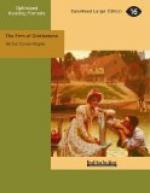“I can get better interest than that,” said the widow gaily. “I’ve got two thousand laid out at seven per cent.—haven’t I, Clara?”
“Safe, too,” said the girl.
“The deuce you have!” thought the major.
“So, when we are making arrangements, I’ll ask your assistance and advice, Major Tanglebobs. I know that we poor women are very bad at business.”
“I shall look forward to the day,” said the major gallantly, rising and taking up his hat. He was very well satisfied with his little ruse and his success in breaking the ice.
“Be George!” he remarked to Von Baumser that evening, “she’s got money as well as her looks. It’s a lucky man that gits her.”
“I vill bet dat you ask her for to marry you,” Von Baumser said with a smile.
“I’ll bet that she refuses me if I do,” answered the major despondently, in spite of which he retired that night feeling considerably more elated than on the preceding evening.
CHAPTER XXVIII.
BACK IN BOHEMIA.
Fortune had been smiling upon the Bohemians of late. Ever since the major’s successful visit to Fenchurch Street he had been able to live in a state of luxury to which he had long been unaccustomed. His uncle, the earl, too, had condescended to think of his humble relative, and had made a small provision for him, which, with his other resources, removed all anxiety as to the future. Von Baumser had his fair share in this sudden accession of prosperity. The German had resumed his situation as commercial clerk and foreign correspondent to Eckermann & Co., so that his circumstances had also improved. The pair had even had some conversation as to the expediency of migrating into larger and more expensive lodgings, but the major’s increasing intimacy with his fair neighbour opposite stood in the way of a change. In any case, they were loth to leave their fourth floor, and to have the trouble of moving their effects.
These same effects were the pride of Major Clutterbuck’s heart. Small as their sanctum was, it was a very museum of curious objects brought from every part of the world, most of them of little intrinsic value, but all possessing a charm of association to their owner. They were his trophies of travel, battle, and the chase. From the bison rug and tiger skin upon the floor to the great Sumatran bat which hung head downwards, as in the days of its earthly existence, from the ceiling, there was not an object but had its own special history. In one corner was an Afghan matchlock, and a bundle of spears from the southern seas; in another a carved Indian paddle, a Kaffir assegai, and an American blowpipe, with its little sheaf of poisoned arrows. Here was a hookah, richly mounted, and with all due accessories, just as it was presented to the major twenty years before by a Mahommedan chieftain, and there was a high Mexican




